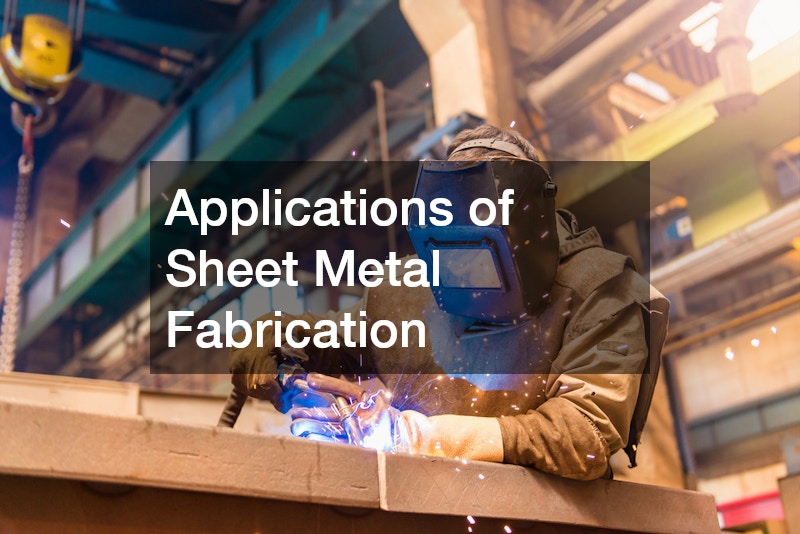
Sheet metal fabrication services play a vital role across industries, enabling the creation of everything from architectural components to intricate machine parts. By transforming flat sheets of metal into finished products through specialized processes, these services provide the strength, precision, and versatility needed for modern manufacturing and construction. This guide explores the fundamentals of sheet metal fabrication, the techniques involved, and the applications that make it indispensable in today’s world.
What Is Sheet Metal Fabrication?
Sheet metal fabrication is the process of cutting, shaping, and assembling flat sheets of metal into functional parts or structures. Metals such as aluminum, steel, stainless steel, brass, and copper are commonly used due to their durability and ability to be formed into various shapes. The fabrication process combines manual craftsmanship with advanced machinery, resulting in parts that meet precise design specifications.
This field is not limited to producing standard parts; it supports customized solutions for industries that require unique shapes, finishes, or performance qualities. The adaptability of sheet metal fabrication ensures that both simple and complex projects can be executed with accuracy and consistency.
Key Processes in Sheet Metal Fabrication
The fabrication of sheet metal involves multiple techniques, often combined to achieve the desired results. Some of the most common processes include:
-
Cutting: This is the first step in shaping sheet metal. Methods such as laser cutting, water jet cutting, and plasma cutting allow for high precision, while mechanical shearing offers speed and efficiency for larger projects.
-
Bending: Using press brakes and other tools, sheet metal can be bent into angles and curves. This process is crucial for creating enclosures, brackets, and structural components.
-
Forming: Beyond bending, forming includes rolling and stamping, which give the metal its three-dimensional shape. These methods are often used to produce panels, cylinders, and other curved structures.
-
Welding: Joining metal parts together is essential in many applications. Techniques like MIG, TIG, and spot welding are commonly used, depending on the material and strength requirements.
-
Punching: Creating holes or cutouts in sheet metal is achieved through punching machines, which help in producing perforated designs or components requiring fastener points.
-
Finishing: To enhance appearance and durability, finishing methods such as powder coating, painting, or anodizing are applied. Finishing also improves resistance to corrosion and wear.
Each process is carefully chosen based on the material, design requirements, and end use of the part or product.
Applications of Sheet Metal Fabrication
The versatility of sheet metal fabrication services extends to a wide range of industries. Here are some of the most notable applications:
-
Construction and Architecture: Sheet metal is used for roofing, cladding, ductwork, and decorative elements. Its strength and flexibility allow architects to design both functional and visually appealing structures.
-
Automotive Industry: Vehicles rely on sheet metal components for body panels, exhaust systems, and engine parts. Fabricated metal ensures safety, performance, and sleek design.
-
Aerospace: Lightweight yet durable, fabricated sheet metal is used in aircraft interiors, structural components, and fuel systems. The precision of fabrication supports stringent aerospace standards.
-
Electronics: Sheet metal is essential in producing enclosures, brackets, and heat sinks that protect and support electronic devices.
-
Medical Equipment: Hospitals and clinics benefit from fabricated sheet metal in equipment housings, surgical tools, and support structures. The ability to maintain cleanliness and precision is critical in this sector.
-
Industrial Machinery: Fabricated components serve as the backbone of manufacturing equipment, from conveyor systems to protective guards.
These examples highlight the widespread reliance on sheet metal fabrication across diverse fields.
Advantages of Sheet Metal Fabrication Services
Organizations choose sheet metal fabrication services for several reasons:
-
Durability: Metal components provide long-lasting performance, even in demanding environments.
-
Customization: Fabrication allows for designs tailored to specific applications, whether standard or complex.
-
Precision: Advanced machinery ensures that parts meet tight tolerances, reducing errors and ensuring fit.
-
Efficiency: Multiple processes can be combined to create finished products with minimal waste.
-
Scalability: Services support both small-scale prototypes and large-scale production runs, adapting to client needs.
These advantages make sheet metal fabrication a cornerstone of modern production.
The Role of Technology in Fabrication
Innovation continues to transform the field of sheet metal fabrication. Computer-aided design (CAD) and computer-aided manufacturing (CAM) streamline the design-to-production process, allowing for greater accuracy and faster turnaround. Automation, robotics, and CNC (computer numerical control) machinery further enhance efficiency and consistency.
Additionally, sustainable practices are gaining traction, with recycling and eco-friendly coatings becoming standard in many operations. These developments not only improve quality but also contribute to environmental responsibility.
Partnering With the Right Fabrication Service
When selecting a provider, it is important to consider their expertise, equipment, and track record. A reliable service should offer a full range of fabrication capabilities, skilled technicians, and quality assurance processes. Clear communication throughout the project ensures that the final product meets expectations and industry standards.
Sheet metal fabrication services are not just about producing parts; they represent a partnership that brings ideas to life with precision and craftsmanship. By choosing a skilled and experienced provider, businesses can secure the solutions they need to support growth and innovation.
From architectural details to aerospace components, sheet metal fabrication services are integral to countless industries. Their ability to deliver durable, customized, and precise solutions makes them an essential part of modern manufacturing and design. As technology advances, these services will continue to evolve, offering even greater possibilities for innovation and performance.
